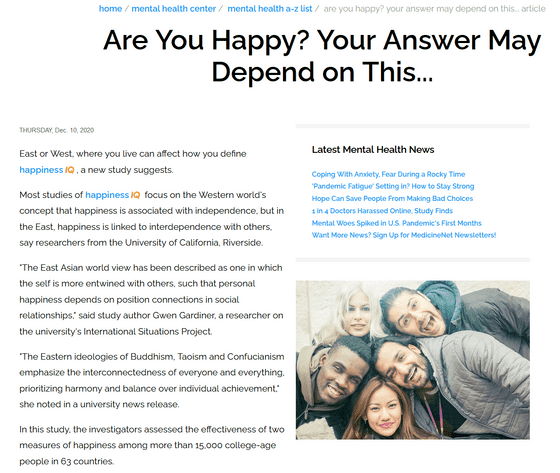What are the surprising facts found by testing people around the world in the 'Happiness Test' in Japan and the United States?

Different cultures and values in the east and west of the ocean have different ways of thinking about happiness. Happiness tests developed in the United States and Japan examined the happiness of people in 63 countries around the world, and found that the scales of happiness differ between the West and the East, as well as surprising facts that surprised psychologists. did.
Happiness around the world: A combined etic-emic approach across 63 countries
How you measure happiness depends where you live | News
https://news.ucr.edu/articles/2020/12/09/how-you-measure-happiness-depends-where-you-live
Are You Happy? Your Answer May Depend on This ... --MedicineNet Health News
https://www.medicinenet.com/script/main/art.asp?articlekey=249697

According to Gwendolyn Gardiner, a psychology researcher at the University of California, Riverside, the main test for quantifying happiness in the field of psychology has been the ' (PDF file) Subjective Happiness Scale. ' It has been used for. The subjective well-being scale, acronym SHS, was developed in the United States and is rooted in Christian values and individualistic sensations, making it ideal for measuring the well-being of people living in the West. It is considered a test.
On the other hand, in East Asian countries, the emphasis is placed on ties with society and others rather than individuals, and the way of thinking about happiness is very different from that of the West. For example, in a study published in 2017, when asked to freely associate words related to the word 'happiness', 'smile' was the most common answer among Americans, while 'family' was the most common answer among Koreans. The result is that '' was the most.

From these past cases, I realized that in the Buddhist, Taoist, and Confucian ideologies rooted in the East Asian region, 'harmony and mutual ties with the surroundings have a more important influence on happiness than individuals.' The research team of Gardiner and colleagues decided to conduct an experiment to test the well-being of people around the world with the ' (PDF file) Collaborative Happiness Scale (IHS) ' developed by SHS and Japan.
A total of 15,368 subjects living in 42 languages in 63 countries participated in the experiment. Subjects visited a website prepared by the research team and underwent two well-being tests, SHS and IHS. As a result of this experiment, it was confirmed that SHS is highly accurate in Western European countries such as Belgium, Denmark, and the United Kingdom. 'In typical Western countries, which are characterized by industrialization, low population growth, and cold climates, SHS tended to be more reliable in general,' the research team analyzed. I will.
On the other hand, IHS was found to be highly accurate, especially in Asian countries such as Japan and South Korea, and less reliable in Western countries. 'The accuracy of IHS is less relevant to the country's economic development and is higher in countries that value'control'. Especially interesting is the accuracy of IHS in the West of that country. It had nothing to do with conversion, so IHS may be a more universal measure of well-being than SHS, albeit less accurate in the West, 'says the research team.

What surprised the research team most was that 'Japan and the United States were highly reliable in both SHS and IHS.' Gardiner commented, 'It's a very interesting and surprising result, because Japan and the United States are two opposite countries that psychologists often refer to when talking about cross-cultural differences.' did.
In addition to the difference in happiness between the West and the East, this study found that both SHS and IHS are less accurate in regions that are neither Western nor Eastern, such as the Middle East and African countries. In a treatise, the research team said, 'In countries without Christian or Buddhist traditions, none of the happiness tests worked properly. In the future, new happiness tests for such areas will be available. We also need to take into account what we need to do. '
Related Posts:
in Note, Posted by log1l_ks







